Another langblr which probably will die very time soon. Sometimes I'll post some aesthetic, poor quality photos. Languages: Polish 🇵🇱 native, English 🇬🇧 B2.2, Spanish 🇪🇸 B1/2, Italian 🇮🇹 A2/B1, Latin 🏛 A1, Portuguese 🇵🇹 A2
Don't wanna be here? Send us removal request.
Text
i love it actually when nonnative speakers make mistakes that reveal how their native languages work.
lots of koreans online say they "eat" drinks which would assume they only have one word which covers the concept of consumption.
arabic immigrants in sweden (my mother included) have a hard time differentiating between "i think/i believe/my opinion is" which suggests that in arabic these different modalities of speaker agency is treated as one or at least interchangeable.
swedish speakers in english will use should/shall/have to/must with much higher nuance precision than native english speakers, to the point where they sound well awkward, because the distinction between these commands in swedish is much clearer than in english. i make mistakes between is/am/are and has/have constantly because swedish only has one pronoun covering all grammatical persons.
i've heard speakers of languages without gendered pronouns (finnish, the chinese dialects, and a tonne more) make he/she mistakes because it's hard(!!) to learn two or more gendered pronouns and when to use them correctly.
how neat is that?! it add a charm to international english usage in particular and make our appreciation of both our native languages and our learnt ones stronger...!!
70K notes
·
View notes
Text
fun fact about languages: a linguist who was studying aboriginal languages of Australia finally managed to track down a native speaker of the Mbabaram language in the 60s for his research. they talked a bit and he started by asking for the Mbabaram word for basic nouns. They went back and forth before he asked for the word for “dog” The man replied “dog” They had a bit of a “who’s on first” moment before realizing that, by complete coincidence, Mbabaram and English both have the exact same word for dog.
121K notes
·
View notes
Text
Also shout-out to the Swedes for just borrowing the French "adieu" into their vocabulary and just spelling it "adjö"
34K notes
·
View notes
Text
I think it's funny that in French the word for "unicorn" is "licorne" because:
The word "unicorne" was first reanalyzed as "une icorne"
The definite article was then added, making it "l'icorne"
The new definite form was reanalyzed once again, resulting in "une licorne"
14K notes
·
View notes
Text

Um hello Polish internet I sincerely apologize for comparing your language to uwu speak...
2K notes
·
View notes
Text

anyone care to explain why my local supermarket has self checkout in latin
18K notes
·
View notes
Text
Speaking of linguistics, there’s one particular linguistic tick that I think clearly separates Baby Boomers from Millennials: how we reply when someone says “thank you.”
You almost never hear a Millennial say “you’re welcome.” At least not when someone thanks them. It just isn’t done. Not because Millenials are ingrates lacking all manners, but because the polite response is “No problem.” Millennials only use “you’re welcome” sarcastically when they haven’t been thanked or when something has been taken from/done to them without their consent. It’s a phrase that’s used to point out someone else’s rudeness. A Millenial would typically be fairly uncomfortable saying “you’re welcome” as an acknowledgement of genuine thanks because the phrase is only ever used disengenuously.
Baby Boomers, however, get really miffed if someone says “no problem” in response to being thanked. From their perspective, saying “no problem” means that whatever they’re thanking someone for was in fact a problem, but the other person did it anyway as a personal favor. To them “You’re welcome” is the standard polite response.
“You’re welcome” means to Millennials what “no problem” means to Baby Boomers, and vice versa.The two phrases have converse meanings to the different age sets. I’m not sure exactly where this line gets drawn, but it’s somewhere in the middle of Gen X. This is a real pain in the ass if you work in customer service because everyone thinks that everyone else is being rude when they’re really being polite in their own language.
160K notes
·
View notes
Text
odin is like “when thor was born the sun shone bright upon his beautiful face. i found loki on the sidewalk outside a taco bell”
432K notes
·
View notes
Text
odin is like “when thor was born the sun shone bright upon his beautiful face. i found loki on the sidewalk outside a taco bell”
432K notes
·
View notes
Text
Wait are we called mammals after mammary glands? Are mammals named after tits???
ARE WE THE BOOBS CLASS?
37K notes
·
View notes
Text
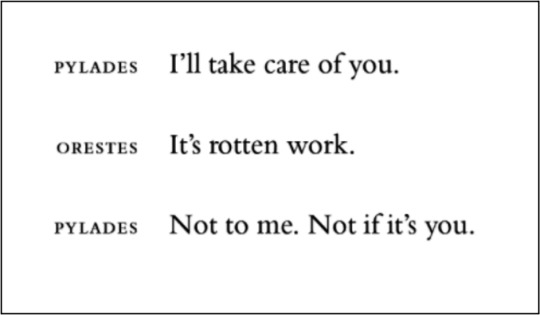
Anne Carson (2009)
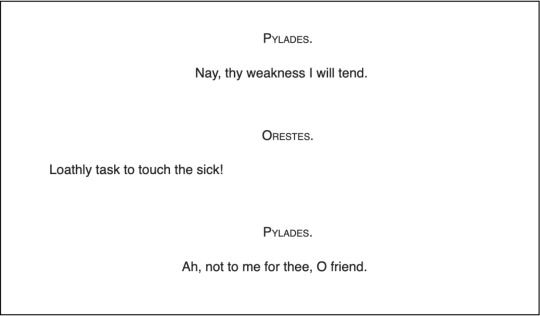
Arthur S. Way (1898)
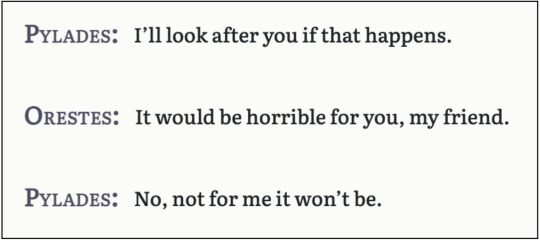
George Theodoridis (2010)
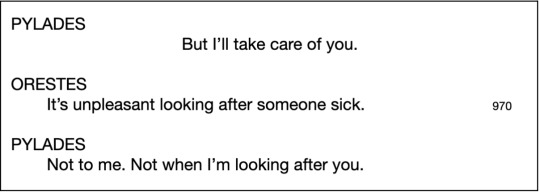
Ian C. Johnston (2010)
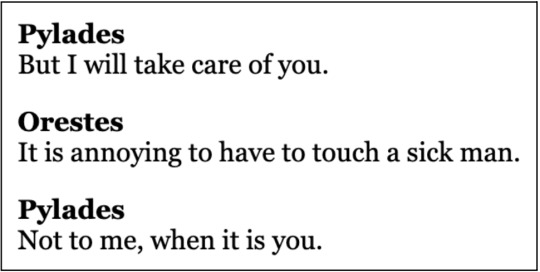
E.P. Coleridge (1910)

Theodore Alois Buckley (1892)

John Peck, Frank Nisetich (1995)

R. Potter (1906)

M. L. West (1987)

William Arrowsmith (1958)

Philip Vellacott (1972)

Michael Wodhull (1782)
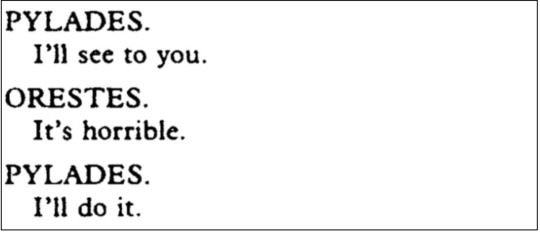
Kenneth McLeish (1997)

David Kovacs (2002)

Andrew Wilson (1993)

Euripides - Original (408 BCE)
62K notes
·
View notes
Text
language is literally so beautiful like in english "i miss you" comes from being unable to locate someone in the field after battle, it's "i look for you but i can't find you" but the french "tu me manques" is also about absence but it's not something i do, it's something that happens to me, as in "you are something essential lacking inside me", in portuguese it's either "sinto a tua falta" as in "i feel your absence" or, from solitude you get "saudade de você" as in "i am lonely [of] you", and in spanish the word comes from stranger and it's something one does, "te extraño" as in "i am making a stranger out of you", and, and, and
21K notes
·
View notes
Text
Fact: The earliest reliably dated use of the phrase “fucked up” appears in the court records of a US Navy court-martial case from 1863; the way the phrase is used suggests that its meaning was already well known at the time, but this is the first known printed record of it that we can confidently put a date to.
Additional fact: Bram Stoker’s Dracula is set in 1897.
Conclusion: It would not anachronistic for your Dracula fanfic to have a character describe the Count as a fucked up old man.
70K notes
·
View notes

